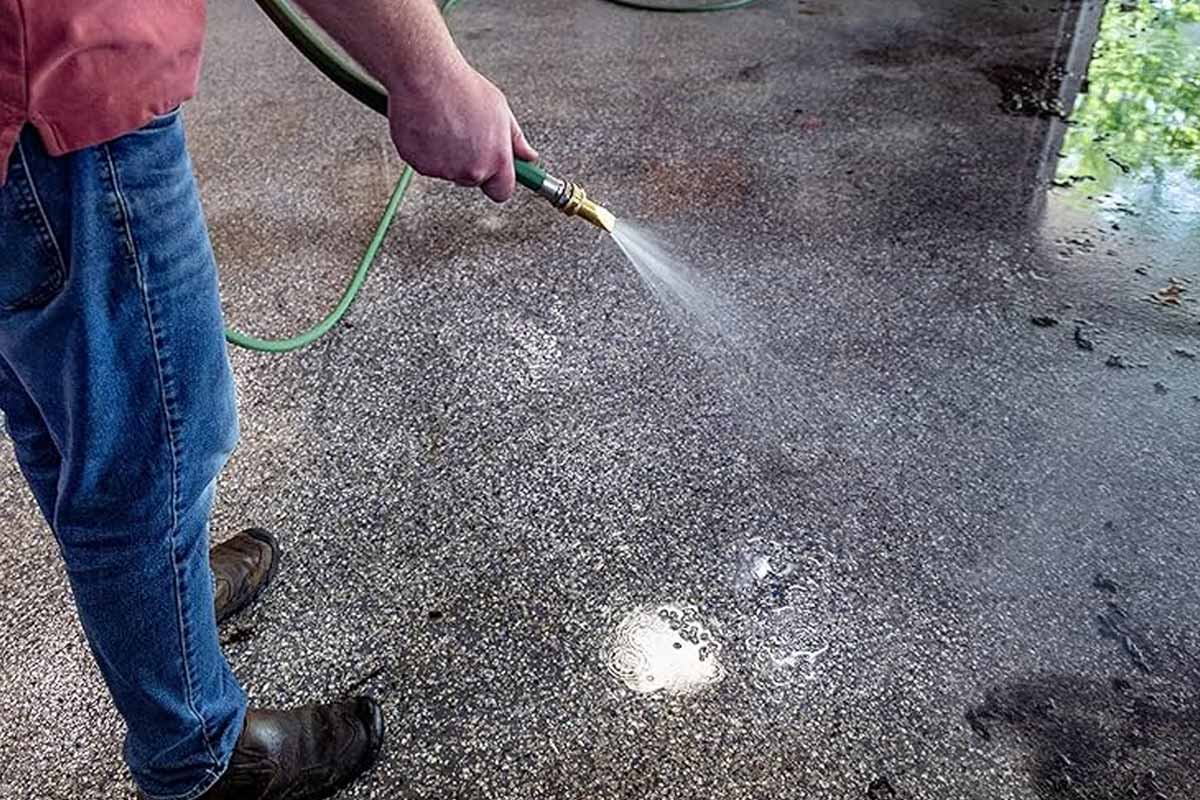You can remove oil stains concrete without wrecking your driveway or losing your weekend. The mess looks permanent, and the smell feels personal. It is beatable with patience, smart products, and a little sweat. I’ll show you a cleaner approach that respects your lungs and your concrete.
Stains that linger, hopes that fade
Oil doesn’t just sit on concrete. It seeps, spreads, and bonds with dust until it feels baked in. Fresh spills act polite for a day, maybe two. After that, they harden their stance and laugh at quick fixes. Dish soap or vinegar might nudge tiny, newborn spots. Old patches shrug and settle deeper, like stubborn guests. You see the shadow every time you park, and it nags. Some stains will lighten, not vanish, and that’s honest. Set your expectations low, then raise your effort.
Work early when you can, and you win more often. If you just moved into a house with a dark garage scar, breathe. You can improve the look, and you can stop it spreading. That alone helps your floors and your mood. This is where you commit to remove oil stains concrete with a process, not a miracle. The goal is clarity and control, not perfection at any cost. A cleaner slab still feels like a fresh start.
Remove oil stains concrete
You’ll use two kinds of help: a chemical that loosens the mess, and an absorbent that grabs it. Think of it as lift and lock. TSP works well for many stains and arrives as powder or liquid. Choose a liquid degreaser if TSP isn’t your thing. Pick products labeled biodegradable when runoff matters. Skip gasoline; it’s flammable, smelly, and hard on everything. Keep bleach, vinegar, and ammonia away from decorative surfaces. They can etch, discolor, and shorten the life of a finish. Laundry detergent can leave wear marks and chalky patches.
Baking soda is handy, yet its alkalinity can surprise delicate treatments. Test a small corner when the concrete has sealers or special finishes. Grab safety gear before you mix or scrub. Gloves, eyewear, and a mask protect you from splashes and dust. Keep a stiff brush or a wire broom in reach. Have kitty litter, baby powder, or oil-absorbent granules ready. You’re stocked, calm, and ready to remove oil stains concrete with a steady hand.
Lift, lock, and rinse without Drama
Start with protection. Long sleeves, gloves, and clear goggles turn a tough job into a safer one. If using powdered TSP, mix to a thick paste per the label. Liquid TSP can go straight down on the stain. Degreaser users, follow the bottle’s timing guidance. Let the product sit undisturbed while it loosens the bond. Give it about thirty minutes for TSP, longer for some cleaners. The chemistry does quiet work while you sip water.
Now scrub with purpose, not fury. A stiff brush reaches pores without shredding the surface. Push the cleaner into the concrete’s tiny pathways. You’re telling the stain its lease is up. Cover the wet area with your absorbent of choice.
Granules trap loosened oil before it wanders elsewhere. Wait ten minutes for light spots, longer for heavy patches. Sweep or shovel the clumps into a bag you can throw away. Rinse with a hose, a bucket, or a power washer if the slab is sturdy. Watch the water run light; that’s your progress report. Repeat for stubborn areas with shorter dwell times between passes. Each round builds on the last, and you’ll remove oil stains concrete layer by layer.
Smart variations for real life
Fresh spills behave differently. Throw down kitty litter the moment you spot a puddle. Let it drink for thirty minutes or overnight, depending on size. Sweep, then try a small bucket with dish soap and warm water. Scrub, wait fifteen minutes, and rinse clean. WD-40 can help with new drips by thinning greasy residue.
Spray, scrub, rinse, then follow with absorbent granules if a shadow remains. Commercial poultice powders can be great for patio pavers. They dry into a crust that you sweep away in the morning. Read the label, respect the dwell time, and avoid sealed drains. Work in shade when possible, since hot sun flashes cleaners dry. Keep runoffs away from garden beds and pets.
If a spot keeps returning, it may be wicking from deeper layers. That’s when patience matters most, and repeats pay off. Once you’ve wrestled a stain down, protect the surface. Use a penetrating sealer designed for garages or driveways. It forms an invisible barrier and speeds future cleanups. Parking mats help under engines and mowers. Tiny habits beat giant messes, and they help you remove oil stains concrete faster next time.
When enough Is enough, call backup
Some stains outlast your Saturday. Large, old patches can run deep and stubborn. You might lighten them well and still see a shadow. That doesn’t mean you failed; it means chemistry met geology. Pros bring hot-water extractors, industrial degreasers, and better nozzles. They know how far to push before surfaces suffer. If you hate chemical work or have poor ventilation, hire it out. Your safety is worth the invoice. Either way, keep a small spill kit nearby. Granules, a brush, gloves, and a labeled bottle live well in a garage bin.
Respond fast when drips happen.Speed is your friend, and routine is your ally. Teach family members the plan for leaks and mower refills. They’ll save you hours and keep floors cleaner inside. Concrete never asks for much, only steady attention. Give it that, and it pays you back with less odor and fewer footprints. You’ll park, step out, and notice what isn’t there: the stain.
That quiet win is the point. You learned how to remove oil stains concrete with confidence, care, and a little grit. Next spill, you’ll smile, reach for the kit, and remove oil stains concrete before it settles.
